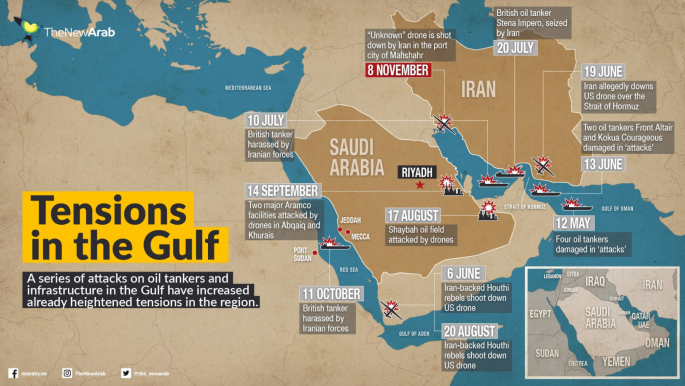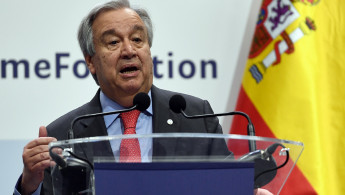UN 'cannot corroborate' Iran was behind Saudi oil attacks
Secretary-General Antonio Guterres told the Security Council on Tuesday that the UN cannot confirm that Iran was responsible for the attacks on Saudi oil installations.
3 min read
The United Nations has said it is "unable to independently corroborate" that missiles and drones used in attacks on Saudi's Aramco oil facilities earlier this year are of Iranian origin, according to Secretary-General Antonio Guterres.
In an annual Iran report seen by Bloomberg, Guterres told the Security Council on Tuesday that it could not conifirm that the missiles were fired from the country as Saudi Arabia's oil-rich east, as has been suggested before.
"At this time, it is unable to independently corroborate that the cruise missiles and unmanned aerial vehicles used in these attacks are of Iranian origin and were transferred in a manner inconsistent with [UN resolutions]," he said.
The UN report went on to reveal investigators from the body were unable to examine the debris of the weapons systems used in the attack and added it is "still collecting and analysing additional information on these cruise missiles and unmanned aerial vehicles".
The attacks on 14 September targeted the Abqaiq and the Khurais oil plants, which briefly brought the price of oil up, and fires caused by the attack shut down more than five per cent of global oil supply. It also cut the kingdom’s oil output by half.
The US and Saudi Arabia blamed the air strikes on Iran and carried out a clandestine cyber attack on the Islamic Republic in October.
Two anonymous US officials told Reuters the operation targeted physical hardware to limit Tehran's ability to spread "propaganda".
The Pentagon refused to comment on the reports, saying it does "not discuss cyberspace operations, intelligence, or planning".
Saudi's defense ministry at the time said the attacks were "unquestionably sponsored by Iran".
Saudi Arabia's Minister of State for Foreign Affairs, Adel al-Jubeir, told reporters in New York in September that the country's allies were helping to find out the cause of the attacks.
"The United Nations sent people to be part of the investigation, other countries have sent experts to be part of the investigation," he said.
UN investigators travelled to Riyadh and were shown photographic comparisons of drones created by Saudi, which showed a "misfired land attack cruise missile" resembled an Iranian cruise missile "Ya Ali".
The UN staff was also shown a photograph from an Iranian exhibition in May 2014 of what may be a mock-up delta wing unmanned aerial vehicle.
Saudi Arabia argued that it was similar to the attack used in the Abqaiq attack.
Iran has vehemently denied being behind the attack, which has been claimed by Yemen's Tehran-lined Houthi rebels.
In an annual Iran report seen by Bloomberg, Guterres told the Security Council on Tuesday that it could not conifirm that the missiles were fired from the country as Saudi Arabia's oil-rich east, as has been suggested before.
"At this time, it is unable to independently corroborate that the cruise missiles and unmanned aerial vehicles used in these attacks are of Iranian origin and were transferred in a manner inconsistent with [UN resolutions]," he said.
The UN report went on to reveal investigators from the body were unable to examine the debris of the weapons systems used in the attack and added it is "still collecting and analysing additional information on these cruise missiles and unmanned aerial vehicles".
The attacks on 14 September targeted the Abqaiq and the Khurais oil plants, which briefly brought the price of oil up, and fires caused by the attack shut down more than five per cent of global oil supply. It also cut the kingdom’s oil output by half.
The US and Saudi Arabia blamed the air strikes on Iran and carried out a clandestine cyber attack on the Islamic Republic in October.
Two anonymous US officials told Reuters the operation targeted physical hardware to limit Tehran's ability to spread "propaganda".
The Pentagon refused to comment on the reports, saying it does "not discuss cyberspace operations, intelligence, or planning".
 |
Saudi's defense ministry at the time said the attacks were "unquestionably sponsored by Iran".
Saudi Arabia's Minister of State for Foreign Affairs, Adel al-Jubeir, told reporters in New York in September that the country's allies were helping to find out the cause of the attacks.
"The United Nations sent people to be part of the investigation, other countries have sent experts to be part of the investigation," he said.
 |
When the team that’s investigating has concluded its investigations we will make the announcements publicly. |  |
UN investigators travelled to Riyadh and were shown photographic comparisons of drones created by Saudi, which showed a "misfired land attack cruise missile" resembled an Iranian cruise missile "Ya Ali".
The UN staff was also shown a photograph from an Iranian exhibition in May 2014 of what may be a mock-up delta wing unmanned aerial vehicle.
Saudi Arabia argued that it was similar to the attack used in the Abqaiq attack.
Iran has vehemently denied being behind the attack, which has been claimed by Yemen's Tehran-lined Houthi rebels.





 Follow the Middle East's top stories in English at The New Arab on Google News
Follow the Middle East's top stories in English at The New Arab on Google News


